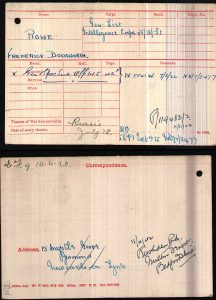2nd Lieut. Frederick Dodsworth Rowe
Frederick Dodsworth Rowe was a Freemason, and one of our forgotten war heroes. He is not listed in the Lodge Temperance WW1 Roll of Honour although the Lodge registers show he was on war service.
At the Lodge Temperance 2557 meeting held at the Assembly Rooms on the 17th July 1916, Frederick or Fred as he was known was proposed by Bro. R. West, Assistant Secretary on behalf of Bro William Elliott, Secretary and seconded by Bro. A. B. Turner as a fit and proper person to be made a Freemason. He was a 26 year old Engineer’s clerk living at 15 Myrtle Grove, Newcastle upon Tyne. At the meeting of Monday 21st August 1916 a successful ballot was held and he was initiated into the Mysteries and Privileges of Ancient Freemasonry on 18th September 1916. He was passed to the second or Fellowcraft degree the following month on 16th October and raised to the Sublime degree of a Master Mason on 20th November 1916.
Frederick went on to be a founding member of Lodge Justice No. 4421, consecrated on 16th June 1922. Of the eighteen co-founders, fifteen were from Lodge Temperance 2557. Lodge Justice is still going strong and meets at the Masonic Hall, Corbridge Road, Newcastle-upon-Tyne, on the 2nd Saturday of the month.
We have been unable to find Fred’s Army Service Record so it’s likely among the 60% of the Service Records damaged or lost as a result of enemy bombing in 1940 during the Second World War. Fortunately, his Medal Index Card has survived and shows he was a 2nd Lieutenant with the Intelligence Corp.
The Intelligence Corps was formed at the outset of the War in August 1914 responsible for gathering, analysing and disseminating military intelligence and also for counter-intelligence and security. It was reorganised in early 1916 to include counter-espionage on our side of the lines. Many spies and suspect spies were tracked down, and Germany’s agents were hindered to such an extent that their activities became no longer a danger. Later the net spread to Italy, Salonica, Eastern Theatres and afterwards to Russia.
The collapse of the Russian empire and the subsequent Bolshevik revolution in 1917 seriously compromised the Allied war effort. German troops occupied the former tsarist Baltic territories and anti-Bolshevik agitators created the “White” army as opposition to the newly installed Communist government. The threat of German pre-eminence in the region was a compelling reason for the Allies to provide the ‘Whites’ with military aid which resulted in the deployment of some 30,000 Allied troops in Russia during 1918.
Fred’s Medal Index Card shows he first went overseas to Russia in July 1918 and was therefore part of this deployment. The 1918, 1919 and 1920 Army Lists record that he gained his commission as Temporary 2nd Lieutenant on 15th August 1918 while in Russia and was working as an interpreter. It’s not known which other languages he spoke but it’s likely to have been German. He was awarded the Victory Medal and the British War Medal in recognition of his service in the War.
Frederick was born on 18th December 1889 in Newcastle upon Tyne to Joseph and Louise Rowe (or Lucy as she was known). Joseph was a warehouseman from Coventry in the Midlands and Lucy from Leeds, Yorkshire. Joseph married Lucy Dodsworth on 15th July 1889 at St. Andrew’s Church, Newcastle upon Tyne. Sadly, it seems Joseph had mental health problems and in 1891 was an inmate at Newcastle City Lunatic Asylum, described as a lunatic. He died in 1898 when Frederick was 9 years old leaving Lucy to raise him as a single mother. By 1911 they had moved to 15, Myrtle Grove, Jesmond where Lucy died in 1927 aged 69.
Fred married Edith Ellen Mowle around 1930. Edith was born in London in 1903 and her father was a Missionary with the London City Mission. They had two children:
Ronald Dodsworth (b 1931)
Freda Deborah Ann (b 1933)
Edith was a registered nurse, whose work took her to many places in England and then in 1934 with her children Ronald, 2 years old and Freda, 1 month old, to work for the Cyprus Mining Corporation, Skouriotissa, Cyprus travelling via Port Said, Egypt. Frederick joined them a year later making the same arduous journey and likely working for the same mining company.
By 1939 the family were back living in Whitley Bay and he was employed as an accountant and manager of an Engineering and Mining Store.




